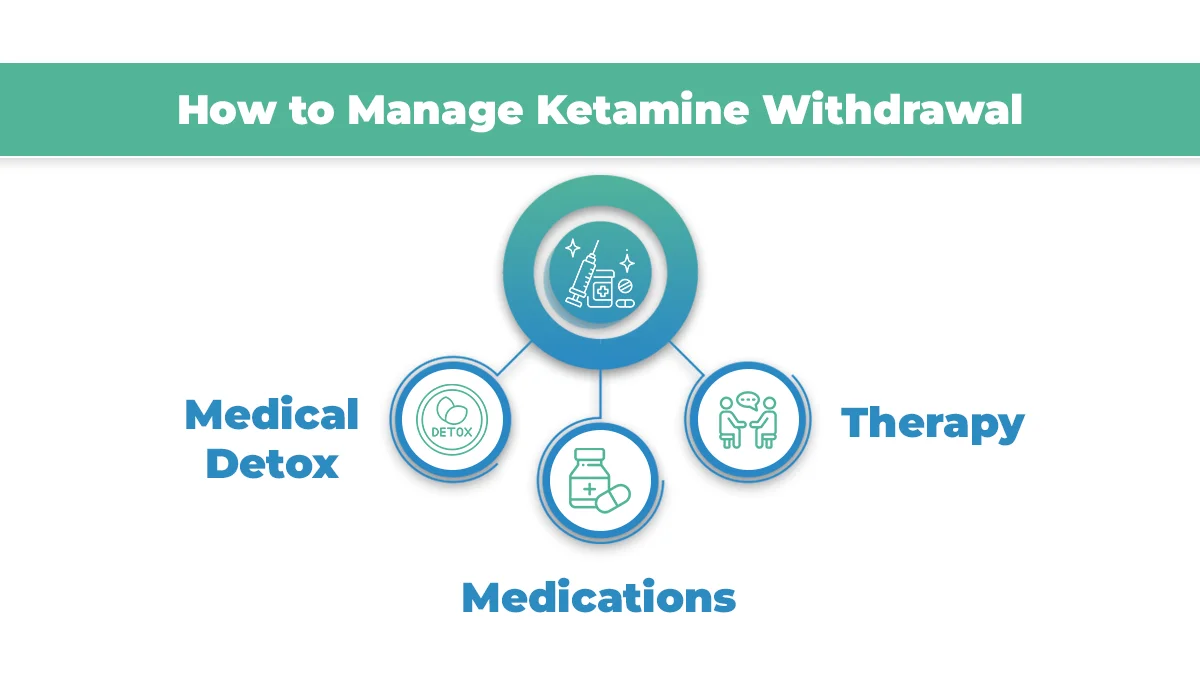
Effectiveness Of Medication-Assisted Treatment
Explore the effectiveness of medication-assisted treatment with The Recovery Team-Newton.

Ketamine is a powerful anesthetic and tranquilizer used in both human and veterinary medicine. It works by inducing blackouts and blocking memory formation, making it essential for surgeries. Beyond medical use, ketamine also influences euphoria and relaxation. That has led to its misuse at social gatherings like clubs.
Abusing this anesthetic on a regular basis can lead to addiction. Ketamine withdrawal occurs when regular users stop taking the drug. If you or someone you know is battling against ketamine addiction, then it is vital to seek professional help. Read below to find out about the withdrawal signs and ketamine treatment options to build a stable life.
Ketamine withdrawal results from its impact on brain chemistry, leading to substance dependency. Here’s what you need to know:
The Recovery Team-Newton is here to overcome ketamine addiction. Do not hesitate to get in touch with us at (508) 978-2772.
Understanding ketamine withdrawal involves examining why it happens and how ketamine affects the brain. Ketamine is a dissociative drug, often used as a recreational drug in the form of a white powder. When individuals misuse ketamine, they risk developing ketamine dependence, which can lead to serious negative consequences.
Ketamine works by altering brain chemistry, creating intense dissociative effects. This alteration can cause psychological dependence, where individuals feel they need the drug to function or feel normal. Over time, the brain starts to rely on ketamine to maintain certain chemical balances.
When the drug is suddenly stopped, these balances are disrupted, leading to withdrawal symptoms. The withdrawal process can be challenging because the brain craves the drug to return to its altered state. Cravings are a part of the most common ketamine withdrawal symptoms. These cravings can be intense and last for days, making it hard for individuals to quit ketamine use.
The ketamine withdrawal timeline varies from person to person but generally follows a pattern. After the last dose of ketamine use, acute withdrawal symptoms usually start within a few hours. These symptoms can include intense depression, psychological issues, and cravings for the drug.
Within the first 24 to 72 hours, individuals may experience psychological symptoms such as anxiety, agitation, and mood swings. These signs can be challenging to manage without support. As the withdrawal progresses into the first week, physical symptoms like nausea, sweating, and insomnia may also emerge.
By the end of the first week, the acute withdrawal phase usually begins to subside. However, psychological symptoms can persist, including cravings and mood disturbances. It’s during this time that individuals may also face challenges in the recovery process, including relapse risks.
In the weeks following, individuals may still experience lingering psychological symptoms, which can vary in intensity. It’s essential for individuals undergoing ketamine withdrawal to seek professional support to navigate the challenges and ensure a smoother recovery process.
Understanding both the physical and psychological signs of ketamine withdrawal is crucial for providing appropriate support and treatment. Here’s what you should know:
When experiencing symptoms of ketamine withdrawal, individuals may encounter physical discomforts that can vary in severity. These may include physical symptoms such as:
Some individuals might also suffer from muscle stiffness or tremors, especially if a person has taken high doses of ketamine on a regular basis. Additionally, withdrawal from ketamine might lead to double vision or difficulty coordinating movements, which can persist for a short period after discontinuing use.
Psychological symptoms of ketamine withdrawal can be challenging to navigate. Anxiety disorders might worsen during this time, accompanied by agitation and irritability. Individuals may also experience:
Moreover, some individuals might continue to experience dissociative episodes or a trance-like state. That can contribute to the cycle of addiction and make recovery more arduous.
Ketamine withdrawal can have a significant impact on daily life. When someone is going through withdrawal from ketamine abuse, their ability to function at home and in their daily activities can be affected.
Firstly, withdrawal symptoms like mood swings, distress, and physical discomfort can make it hard to concentrate on tasks or interact with others. That can disrupt normal routines and make fulfilling responsibilities at home or work challenging.
Secondly, individuals experiencing withdrawal may struggle with mental health conditions such as depression or anxiety. These conditions can worsen during withdrawal, leading to feelings of hopelessness or suicidal ideation. Moreover, if someone has been using illicit ketamine, they may face legal consequences or social stigma, adding to the stress and challenges of withdrawal.
Medical professionals diagnose ketamine addiction by recognizing the signs of drug dependence and understanding the patient’s history. After diagnosis, the medical team suggests various treatments to help you overcome withdrawal symptoms and achieve sobriety.
For individuals experiencing severe withdrawal symptoms or those who have been using ketamine in higher doses, medical detox may be necessary during an inpatient or outpatient program. Medical detox involves supervised treatment in a healthcare setting to manage severe withdrawal symptoms.
In such facilities, medical professionals can monitor vital signs and provide supportive care to manage discomfort. This process helps ensure safety and comfort during the initial stages of withdrawal.
In managing ketamine withdrawal, medical professionals may sometimes prescribe medications to alleviate specific symptoms. These medications could help address issues like nausea, muscle pain, or anxiety that commonly accompany withdrawal. However, consulting a healthcare provider before taking medication is essential to ensure safety and effectiveness.
Therapy plays a vital role in the treatment of ketamine withdrawal. Individual therapy sessions can help a patient explore the underlying reasons for ketamine use, develop coping strategies, and address any psychological issues contributing to their substance use.
Group therapy can also be beneficial when individuals share experiences and support one another. Support groups, whether in-person or online, provide a supportive environment where people can connect with others who are going through similar experiences.
When someone stops using ketamine after taking it for a while, they might experience withdrawal symptoms. These can affect the body and mind. Physical withdrawal symptoms may include sweating, shaking, and feeling sick. Tolerance to ketamine can also develop, meaning a person needs more of it to feel the same effects.
Some people might use ketamine to treat treatment-resistant depression or for pain relief, but using too much can lead to an overdose. It’s important to remember that ketamine is a prescription drug, and stopping it suddenly can cause withdrawal symptoms. Seeking medical help is crucial for managing withdrawal safely.
Managing ketamine withdrawal usually involves medical detox and therapy. Doctors may gradually reduce the dose to help ease withdrawal symptoms during the detox process. Medications can be given to manage specific symptoms like anxiety or insomnia.
Therapy, such as group therapy, can help people cope with cravings and learn healthier ways to deal with stress. Support groups or counseling can provide emotional support during the withdrawal process. It’s essential to have a supportive environment and professional guidance to safely manage withdrawal.
To safely stop using ketamine without experiencing withdrawal symptoms or harming the body, it’s important to seek help from a doctor or healthcare provider. They can create a plan to gradually reduce the dose of ketamine to minimize withdrawal effects.
It’s also helpful to engage in therapy or counseling to learn coping skills and manage cravings. Building a support network of friends and family can provide emotional support during this time. Avoiding triggers and situations where ketamine use is likely can also help in staying away from the drug.
Ketamine withdrawal can complicate the recovery process and can lead you or your loved one trapped in the cycle of addiction. Receive ketamine addiction treatment under professional guidance and support at The Recovery Team-Newton.
Our day treatment program offers a comforting environment where you will receive medical detox with structured therapy sessions and medical supervision. To alleviate ketamine withdrawal symptoms and ensure your recovery, we offer medication-assisted treatment (MAT), which combines medication use with counseling.
Begin your journey to recovery with us and step into a brighter, drug-free future. Reach out today at (508) 978-2772 to take the first step towards reclaiming control of your life.

Explore the effectiveness of medication-assisted treatment with The Recovery Team-Newton.

Explore the examples of dual diagnosis and its treatment plans for better outcomes with The Recovery Team-Newton.

Explore how long drug rehab programs are with the complete guide from The Recovery Team-Newton.